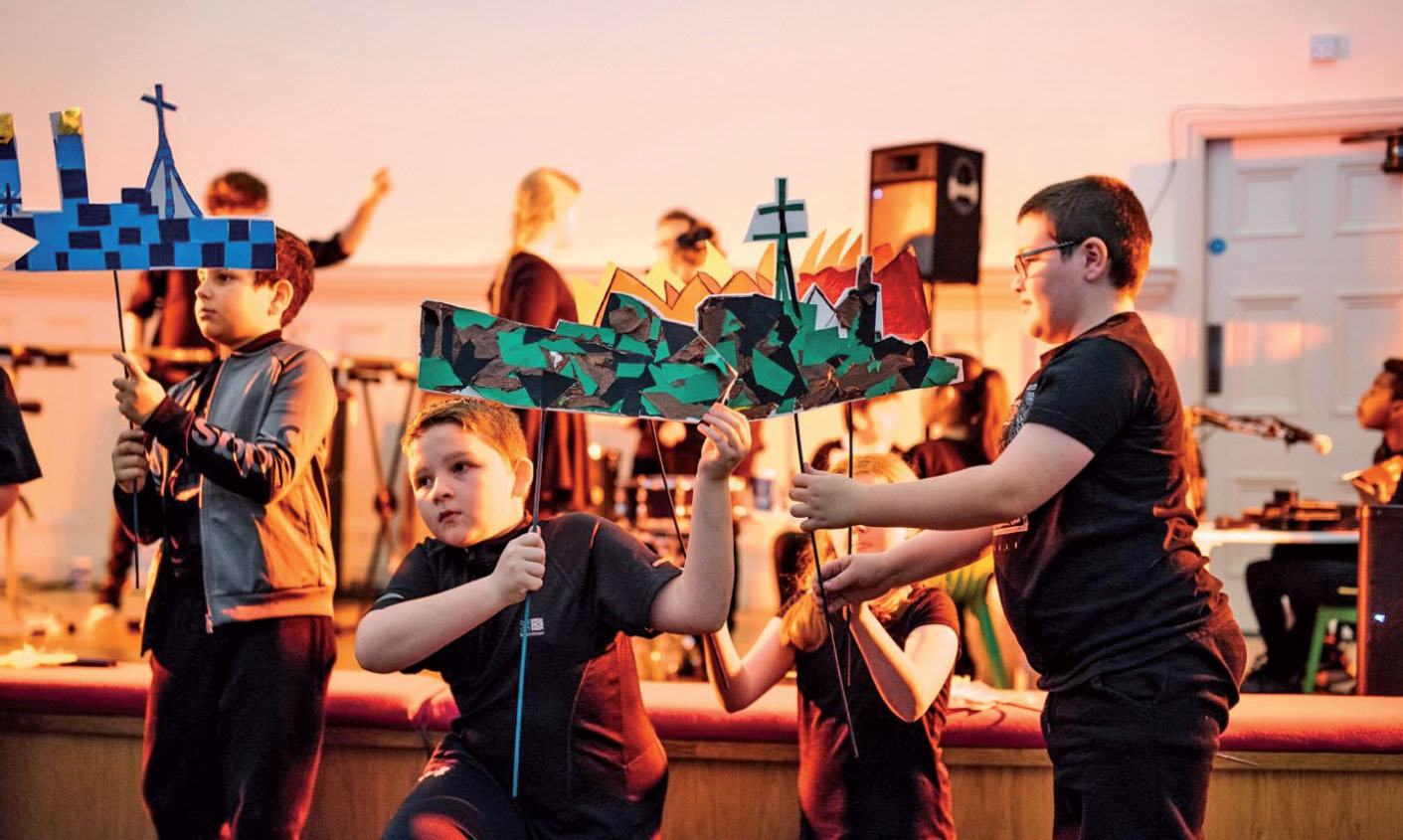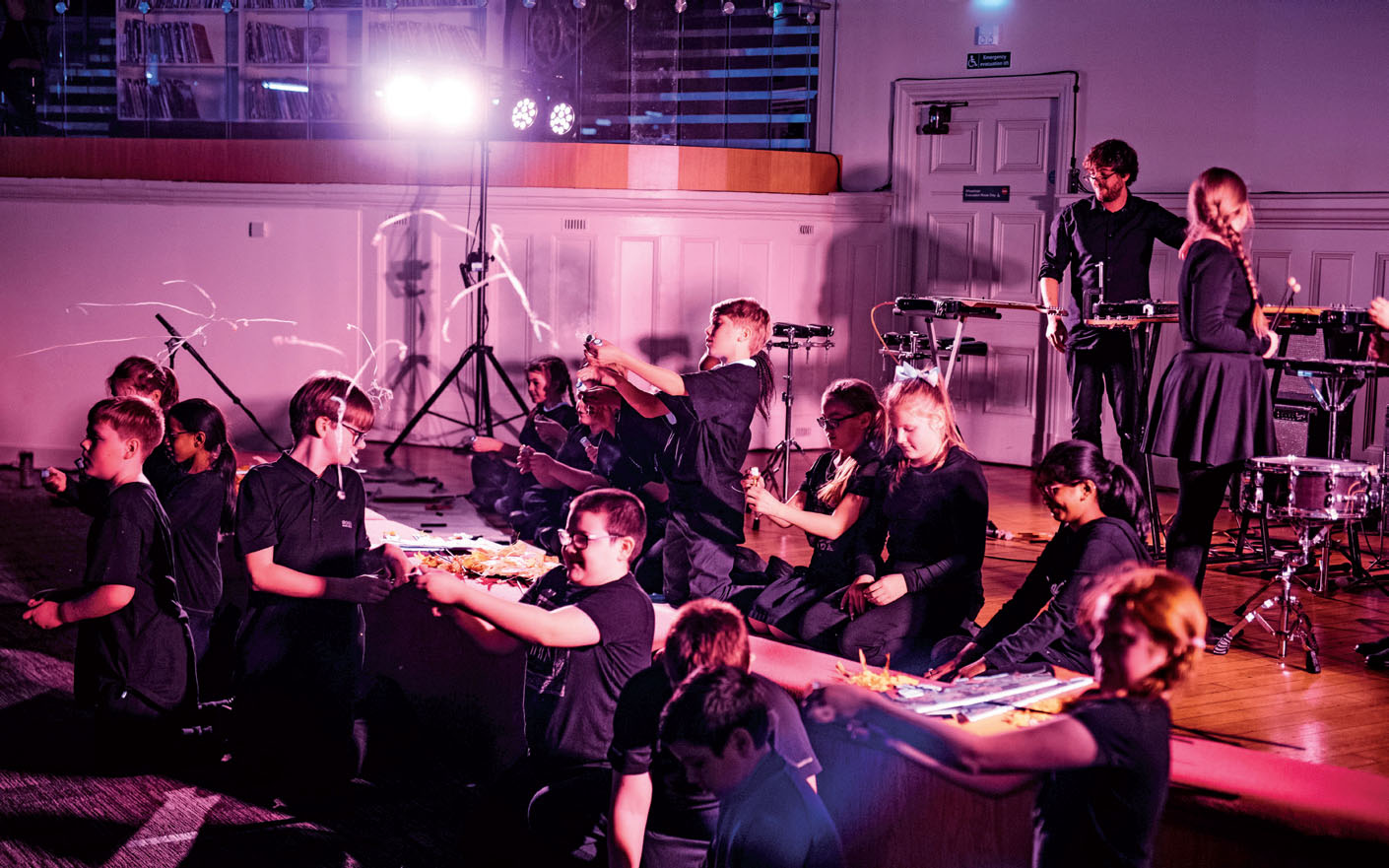
Descending down steep, narrow concrete steps leads me into a strip-light-lined corridor of cold, angular walls, twisting left and right past multiple oddly-shaped rooms. The ceilings are low, and the walls are uncomfortably close until we step suddenly into an unexpectedly large room, which explodes in a strange and somewhat oppressive grandeur. It is a tall dark room, very wide but short, with old-fashioned desks lined up to face towards a huge black side wall. Here, lines like fishing nets are drawn in chalk: gridlines for an enormous map of the North Atlantic, a mass of black sea edged with featureless contours of land. The focus here is the sea, the space between land, and the little picture cards of ships and aircraft stuck to the map look tiny and insignificant against this huge, ominous darkness. This is the map room of Liverpool's Western Approaches museum, the Second World War bunker where the strategic organisation of the Royal Navy and Air Force joint command's Battle for the North Atlantic was masterminded. This place impresses upon me: it feels important, and it was.
In this room, and the many other spaces of this labyrinthine bunker, for a week in mid-December a group of children from different schools in Speke were preparing for a unique performance, ‘Speke and the Sea’. This project was organised by Hand Of, who work throughout the UK with particularly disadvantaged children and enable learning through connecting them to their local histories and narratives. Hand Of's unique focus is in the embedding of this learning in a real place, a place rich with local (and in this case world) historical value. For Speke and the Sea, the children were immersed in many experiences to explore the Liverpool of the past and recreate this in the moment. This included puppet making, reflective writing, creative writing, acting and music-making. A visit to Liverpool Central Library's archives also allowed the children to read accounts from young people of wartime Liverpool, watch archival film, and pore over old photographs. In every possible way, this project was hands-on, the children utterly immersed in learning experiences.
Further gravitas was added to these experiences through the way that the children's creations (puppets, narratives, musical sounds and so on) were included in a final pupil-led public performance. This creative process was guided by various professional artists working with Hand Of, whose expertise in their field allows for particularly rich and authentic experience. For Speke and the Sea, Liverpool's own Ex-Easter Island Head (an experimental guitar and percussion ensemble) led the children to explore musical sounds in creative, engaging and context reactive ways. In the performance children ‘fired’ snare-drum rolls at each other like machine guns during a bombing raid while party poppers exploded like shells. Kazoos were used to explore different wartime sounds (muffled radios, NATO phonetic alphabets and callsigns) and create musical versions of Morse code (dashes and dots as long and short notes). The children sang their own wartime song based on archival documents that demanded ‘All children must come to school today’ despite the chaos of the Blitz.

‘Dazzle Ships’ on fire
What is particularly impressive with Hand Of's work is the way the children engage with these projects. The children in this project were chosen precisely because, for various reasons, they find typical classroom learning challenging, often struggling to fit into the structures, expectations and curricula of the primary school. There is a certain poetic connection between these children and that huge dark map, on which little figures were isolated, endangered or missing. And yet for a week in December they were positively engaged every day. They made self-portrait shadow puppets, telling their stories on a huge white screen; they created ‘Dazzle Ships’ on fire using paper collages of camouflaged wartime paint-jobs; they pored over the actual diary of Pauline Richards, who was ten in 1940, and wrote their own diaries to be archived alongside Pauline's for future Liverpool children. At the end of the week all these experiences, stories and learnings were drawn together in a full-scale performance, and children lacking confidence in school stood on stage to share their stories, their learning, their music, their art and themselves.
So what can we take away from this? Well, if we think back to our most memorable experiences from primary school, those moments permanently etched in our minds, what do we see? Certainly we remember bad experiences, those times we were made to feel different, isolated or vulnerable. Increasingly, I worry about the way schooling has become driven by measured progression, by the need to prove that all children are developing in a linear and assured fashion, and the dominance of lessons dictated by their assessable content. In this context, I fear the impact that this has for those children who don't fit, those who struggle to sit silently, answer questions and ‘learn’. I fear their difference increasingly isolates them within the classroom, that they are in real danger of being ‘lost at sea’ and that this vulnerability abides with them for the rest of their lives. However, thinking back on my own education I vividly remember wonderful projects I was immersed in and the way they nurtured a life-long love of learning. I remember a colourful butterfly farm and tropical fruit tasting. I remember wrapping an Egyptian mummy and the National Portrait Gallery. I remember singing in a children's opera – it was called Alba and I got to wear a Roman helmet…
So, I dare to call for more immersive experiences in education, to make learning about burrowing into topics and exploring them in every possible way. I ask that we abandon assured outcomes and discover new ones daily. I suggest that we, as teachers and for the sake of our pupils, take risks and learn alongside them. Hand Of has highlighted to me the power of immersive learning and the way this transforms young people's lives: the child that had never been to school more than three days in a row who came every day for Speke and the Sea; another child who doesn't socialise well with classmates but for a week happily talked and worked with children from two other schools; and the teacher who wrote in their diary that they were proud of their children and hoped to keep learning alongside them.

Creating the sounds of the Blitz: explosions and gun fire








